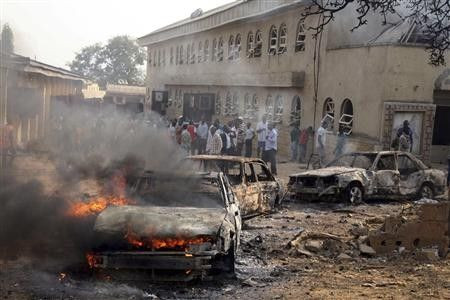39 Dead in Nigeria Christmas Day Bomb Attacks, Boko Haram Claims Responsibility

Between 27 and 40 people have been killed in Nigeria on Christmas Day in a series of coordinated bomb attacks purportedly by Muslim group Boko Harm, including the bombing of several churches during holiday services.
A purported spokesman for Boko Haram claimed responsibility for the bombing of a church outside Nigeria's capital Abuja and other attacks. Nigeria's national security advisors have also blamed the group for the bombings.
'I don't know where my children are.'
Nigeria is a country divided between the mainly Muslim north and the largely Christian south. Boko Haram, an Islamist sect that aims to impose sharia law across the country, was responsible for a series of Christmas bombings in 2010, as well.
The first target, St. Theresa's Catholic Church in Madala near the capital, was filled with worshippers when a bomb exploded just outside. A Reuters reporter neat the church saw the front roof of the church and several houses near by destroyed by the blast. Five burnt out cars smoldered, some with passengers still inside.
We were in the church with my family when we heard the explosion. I just ran out, churchgoer Timothy Onyekwere said. Now I don't even know where my children or my wife are. I don't know how many were killed but there were many dead.
Some hours later, more bombings were reported at the Mountain of Fire and Miracles Church in Jos, and at a church in north in Gadaka.
Following the church bombings, a suicide bomber killed four security officials at the State Security Office in Damaturu, a town in the northeast.
Conflicting reports state that between 27 and 40 people are reported dead so far. Most sources report at least 39 victims.
Latest in Boko Haram Bombings
Jos, an ethnically and religiously diverse town, was targeted by Boko Haram (which is the Hausa language of north Nigeria means Western education is sinful) last year as well, on Christmas Eve 2010.
A series of bomb blasts in the city killed 32 people on Dec. 25, 2010, as well as others killed in church bombings in the north.
The Muslim extremist group also claimed responsibility for the August suicide bombing of UN headquarters in Abuja, which killed at least 24 people.
Burning Barricades Near Abuja
After the 2011 church bombings, thousands of furious youths set up burning road blocks on the highway from Abuja, the capital, to Nigeria's Muslim-heavy north.
We are so angry, shouted one man as a line of cars packed behind the flaming barricades.
Police and military dispersed the crowd by firing live rounds of tear gas into the air.
World Leaders Express Solidarity, Condemn 'Cowardice'
The White House condemned the senseless violence and tragic loss of life in the hours after the bombings were reported. Spokesman Jay Carney offered sincere condolences to the Nigerian people, especially those who lost loved ones in the blasts.
French President Nicolas Sarkozy expressed solidarity in Nigeria's fight against terror activity, joining UK Foreign Sacretary William Hague and German Foreign Prime Minister Guido Westerwelle, who condemned the attacks as the spawn of cowardice and fear.
Israel has offered to send medical aid. The Vatican condemned the church attacks as an act of blind hatred... [seeking to] arouse and feed even more hatred and confusion.
Nigerian President Goodluck Jonathon, meanwhile, called the attacks an unwarranted affront on our collective safety and freedom.
Nigerians must stand as one to condemn them [the bombers], Jonathon, a Christian from the north, said in an official statement today.
I want to reassure all Nigerians that [their] government will not relent in its determination to bring to justice all the perpetrators of today's acts of violence and all others before now.
'There were corpses littered everywhere.'
President Jonathon, however, made very similar statements after previous attacks by Boko Haram members.
At least 280 people have been killed in terror attacks in Nigeria since November, the result of a military crackdown that officials say killed some 59 Boko Haram members in Damaturu this week.
The attacks and counter-attacks continue despite the well-publicized raids of bomb factories and the arrests of alleged terrorists.
Nor are those who witnessed the horrific bombings very comforted by national or international words of condemnation.
[There were] corpses littered everywhere, said Benjamin Ekwegbali, a social worker at the church. It [the initial blast] shook everywhere.
''When I looked back to see what happened, it was difficult to see anything. Everywhere was dark. Fire was burning.''
'Revolution Now'
Boko Haram, which many sources speculate has ties to Al Qaeda in Afghanistan, launched onto the national stage in Nigeria with an attempted uprising back in 2009, ending in a brutal military assault against the Muslim group that left some 800 dead.
Since the Islamist group re-emerged in 2010 with a series of assassinations, tensions in Nigeria have been headed to a boiling point, and local officials are concerned the Christmas Day bombings may have brought that explosive conflict to a head.
This is like an internal war against the country, Nigerian police affairs minister Caleb Olubolade said. But as the sect wages war, other citizens may be poised to strike back.
After the bombing at St. Theresa Catholic Church, according to AP, someone picked up a piece of burnt wood from the wreckage and left a message, though the recipient is unknown.
What was scrawled on the cement walls? Revolution now in the country.
© Copyright IBTimes 2024. All rights reserved.





















